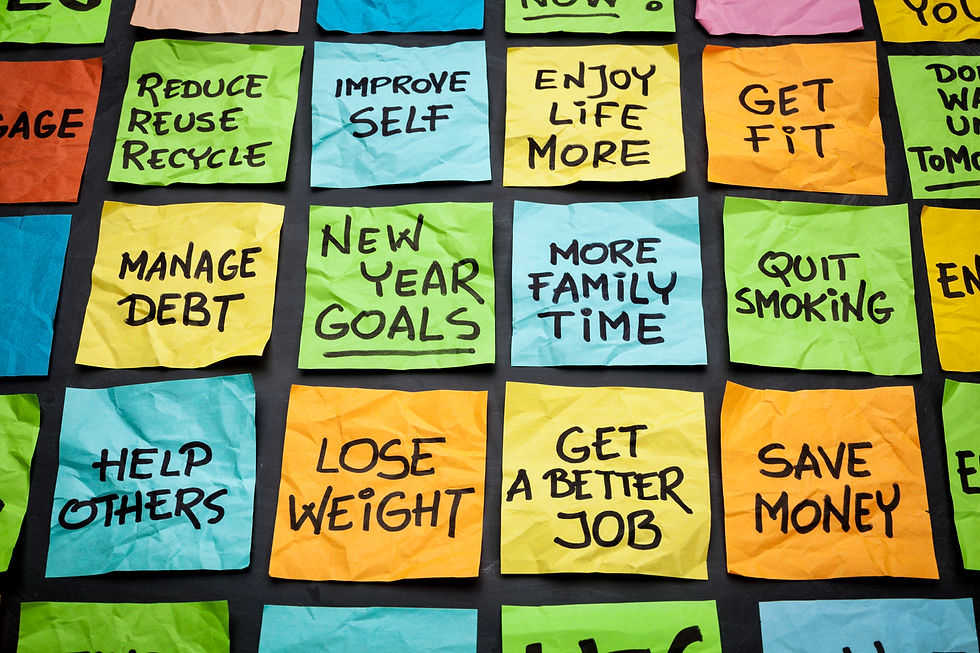How to Make Your New Year’s Resolutions Stick: 10 Proven Strategies for Lasting Change
- Jan 9, 2025
- 4 min read
Every year, millions set ambitious New Year’s resolutions, from getting fit and saving money to learning new skills and improving relationships. Yet, studies show that most resolutions fail by mid-February. Why? Because good intentions aren’t enough — they need structure, strategy, and a mindset shift to succeed.

Let’s explore strategies for ensuring your New Year’s resolutions stick, helping you build habits that last well beyond January.
Reflect on the Past Year
Before setting new goals, take time to review the previous year. Reflect on what worked well, identifying habits or goals you achieved. Consider what didn’t go as planned and analyze the obstacles or patterns that led to those outcomes. Finally, ask yourself what lessons you can take from your successes and setbacks. These insights will be a foundation for setting more effective goals this year. Write down your successes and key lessons from the past year.
Choose Meaningful and Specific Goals
One of the biggest traps people fall into is setting vague resolutions like “exercise more” or “lose weight.” These goals lack direction and measurable outcomes, making it easy to lose focus. Instead, use the SMART framework to set clear and actionable goals. SMART goals are a structured and proven method for setting clear, actionable, and achievable objectives. Here’s an example:
Specific: Define your goal (e.g., lose 10 pounds in 3 months).
Measurable: Track your progress with clear metrics (e.g., weigh yourself weekly to monitor progress).
Achievable: Make sure your goal is realistic (e.g., aim to lose 1–2 pounds, not 10, per week).
•Relevant: Ensure your goal aligns with your motivations (e.g., to feel healthier, have more energy, or fit into a favorite outfit).
Time-Bound: Set a clear deadline (e.g., lose 10 pounds by April 1st).
Example of a SMART Goal for Weight Loss:
"I will lose 10 pounds over the next 3 months by exercising for 30 minutes, 4 times a week, and reducing my calorie intake by 300 calories per day."
Focus on Building Habits, Not Just Goals
While goals provide direction, habits drive long-term consistency. Start small by breaking your larger goals into tiny, manageable habits. For example, instead of planning to meditate for 30 minutes daily, begin with just 2 minutes. Link your new habits to existing routines — for instance, floss immediately after brushing your teeth. Use the 2-minute rule as a guideline: any new habit should be simple enough to complete in less than 2 minutes. Start today by identifying one small habit that aligns with your resolution. Learn more on how to build new habits.

Create an Action Plan
A resolution without a plan is just a wish. Break your resolution down into monthly, weekly, and daily tasks. Add these tasks to your calendar to make them non-negotiable commitments. Anticipate potential obstacles, such as lack of time or motivation, and create strategies to overcome them. For example, if your goal is to “get fit,” your plan could include losing 2 pounds per month, exercising 3 times weekly, and taking a 15-minute walk daily. Write down your first 3 actionable steps right now to kickstart your plan.
Build Accountability
Sharing your goals with others significantly increases your commitment to them. Find an accountability partner to check in with you regularly or join a group or online community focused on similar goals. Tools and apps like Habitica, Strides, or MyFitnessPal can also help track and motivate your progress. Share one of your resolutions with someone you trust and ask them to help keep you accountable.
Track Progress and Celebrate Small Wins
Consistent progress tracking keeps you motivated and helps you identify areas for improvement. Use journals, habit-tracking apps, or physical checklists to monitor your habits. Celebrate small milestones, whether treating yourself to a movie night after two weeks of consistent workouts or buying a new book after hitting a savings target.Set a reward for your first milestone to keep yourself motivated. Don’t be afraid to adjust your approach if something isn’t working.

Develop a Resilient Mindset
Setbacks are a normal part of any journey, so expect them and prepare to bounce back. Practice self-compassion when you slip up instead of resorting to harsh self-criticism. Shift your mindset to focus on identity rather than just action — instead of saying, “I want to run,” say, “I am a runner.” This subtle shift helps solidify your habits as part of who you are. Write a positive affirmation about your resolution and repeat it daily. Learn more on how to develop resilience and thrive through any challenges.
Revisit and Reassess Regularly
Regular reflection helps you stay on track. Schedule monthly check-ins to evaluate your progress, celebrate successes, and adjust your approach if needed. Goals can and should evolve as your priorities shift throughout the year. Remember to stay flexible — progress doesn’t always follow a straight path. Add a recurring monthly check-in to your calendar to ensure you stay aligned with your resolutions.
Embrace the Long Game
Resolutions aren’t sprints; they’re marathons. Consistency is more important than perfection. Celebrate the process rather than focusing solely on the outcome and remember your “why” — the core reason that motivated you to start in the first place. Keep this reason visible, whether as a written note on your desk or a daily phone reminder. Write down why your goal matters and revisit it when your motivation dips.
Use Tools and Resources
Leverage tools and resources to achieve your goals more easily. Stay organized using productivity and habit-tracking apps like Notion, Trello, or Habitica. If you feel stuck, consider joining workshops or hiring a coach for personalized guidance.
Takeaways
Making your New Year’s resolutions stick requires intentionality, structure, and patience. Start small, stay consistent, and embrace setbacks as opportunities to learn. Remember, lasting change isn’t about achieving a single goal — it’s about building habits that align with your values and lifestyle. This year, don’t just set resolutions. Commit to making them part of who you are. Now, what’s your first small step going to be?










